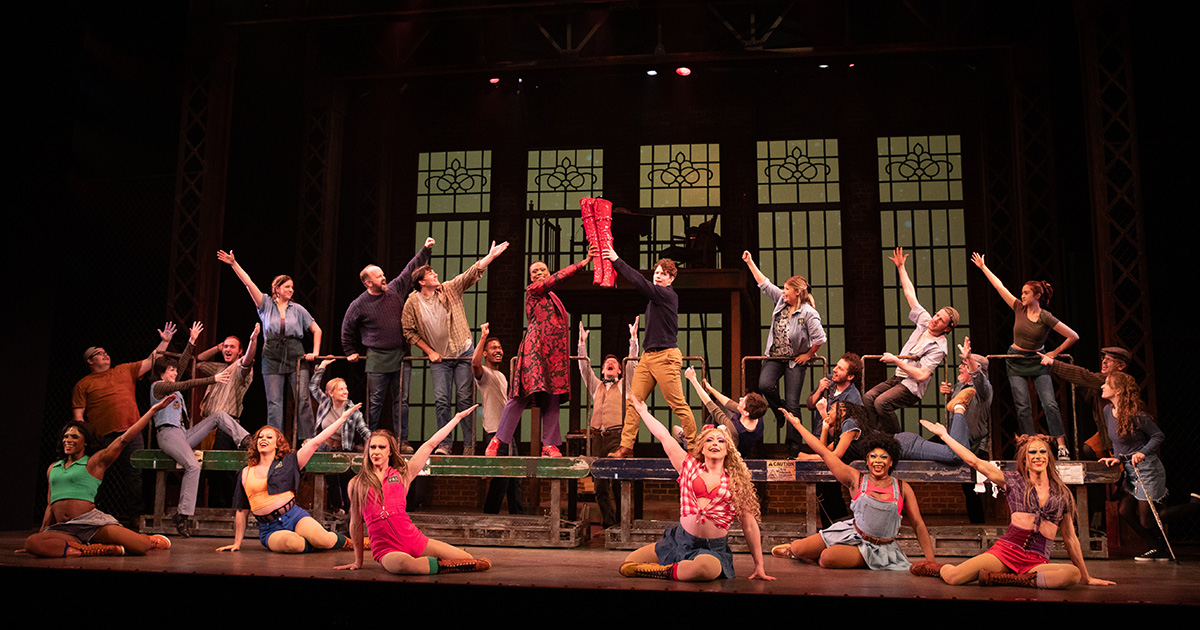When Kinky Boots, the cleverly amusing British film written by Tim Firth and Geoff Deane, opened on U.S. screens in 2006, the dramatic character of the “drag queen that saves the day” had not yet been burdened with the responsibility of being society’s truth-teller and the symbol of giving, compassion, and acceptance. Now, of course, attention from both sides of the societal divide have created the quintessential “underdog story,” albeit a spicy one—one that Broadway could hardly pass up. And it didn’t. 2013 saw the Broadway opening of the musical Kinky Boots, music and lyrics by Cyndi Lauper, book by Harvey Fierstein. Subsequently, along came six Tony Awards, including Best Musical, Best Original Score, Best Choreography, and Best Actor in a Musical to Billy Porter for his role as Lola, aka Simon, the drag queen with a quirky, but genuine nobility.
As its final pick of the company’s season, the Clarence Brown Theatre opened its own production of Kinky Boots on Friday evening. As it turns out, this production owes most of its genetic underpinning to that Broadway show thanks to director Rusty Mowery, a CBT alumnus and Broadway success story. Mowery was Associate Choreographer on that production. As director, he has not only replicated the original choreography but has given the production its unrelenting energy and its delightfully impactful, in-your-face attitude.

Change, or the inability to accept change, lies at the feel-good heart of the Kinky Boots plot. On the death of his father, Charlie Price (Wes Williams) inherits a stodgy and failing shoe factory in Northampton. Although planning to abandon the shoe business and move to London with his opportunity-seeking fiancé, Nicola (Grace Belt), he comes to understand that the factory is the only livelihood of the workers, some of whom he has known since childhood. His plight is he cannot just let it go. Aware that he must find a new niche to set the company apart if it is to survive, Charlie struggles with what that may be. By chance, he meets a bold and brassy drag performer, Lola/Simon (Omari Collins), who convinces him there is a real need for quality footwear that is both strong and sexy for cross-dressing performers—certainly a niche market that could save the factory.
Clearly, one should avoid doing the math on the financial viability of this and just accept this narrative pathway, one that makes the case that being who you are is liberating and will solve all problems. Of course, when supported by Lauper’s addictively tuneful score and Mowery’s choreography, it does actually seem to make a lot of sense, especially when one is bombarded by a throbbing pulse in musical form.
Williams and Collins make this thing work, each coming at the premise from different angles, but both with great vocal ability and serious dramatic chops. Add to this a solid secondary cast along with some brilliantly compelling ensemble numbers with Lola’s backup performers, the six Angels, and the factory floor workers. “Sex is in the Heel” is electrifying as is the Act I Finale, “Everybody Say Yeah!,” certainly one of the most exuberant and breath-taking Act I finales I can recall.

Interestingly, the creators have put real substance and distinctiveness into the factory worker characters. McKinley Merritt was terrific as Lauren, her infectious smile and comic timing had the audience rooting for her. Her number “The History of Wrong Guys” was not merely impressive, it was magical.
Not surprising, David Crawford and Laura Beth Wells made George and Trish into full-bodied, meaningful characters that seemed to be everywhere, all at once, on the stage. Also painting a real character was Denzel Dejournette as burly boxer and factory worker Don, who learns from Lola that there is a lot more in being a man than mere posturing.

The CBT orchestra pit was well-filled and balanced by music director and conductor Terry D. Alford and his 13-member ensemble, their performance of the score nicely reinforced along with the body-miked cast by sound designer and CBT faculty Joe Payne. As usual, CBT faculty scenic designer Christopher Pickart has given us a lot to look at in a deliciously grungy factory interior and exterior—one can almost smell the leather. Making a CBT debut was guest lighting designer Todd Wren, who knocked some socks off with special moments. MFA candidate Kaelyn Williams’ costumes were a huge success for both workers and dancers—understated and over-the-top. The BOOTS, I understand, were the original Gregg Barnes design.
Admittedly, a lot has to get said in terms of storyline in Act II, so one does feel a dip in the energy as the plot lines converge. That said, the Kinky Boots finale number “Raise You Up” is as rousing a conclusion as exists in show business—optimism and exhilaration all rolled into one. In this case, too, one size fits all.
Music and Lyrics by Cindi Lauper • Book by Harvey Fierstein
Directed by Rusty Mowery
Wednesdays – Saturdays at 7:30 PM; Sundays at 2:30 PM — Through May 5
Tickets and Information





